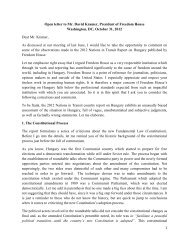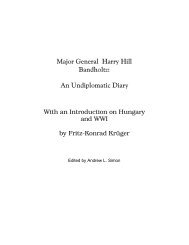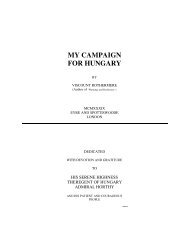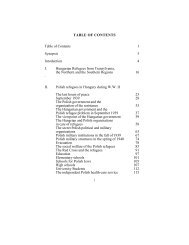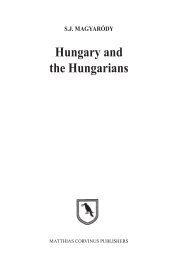The Fate of Western Hungary 1918-1921 - Corvinus Library ...
The Fate of Western Hungary 1918-1921 - Corvinus Library ...
The Fate of Western Hungary 1918-1921 - Corvinus Library ...
You also want an ePaper? Increase the reach of your titles
YUMPU automatically turns print PDFs into web optimized ePapers that Google loves.
involvement in the royal coup attempt. <strong>The</strong> following day, April 15, Count<br />
István Bethlen (1874–1946) formed a government and led the country for a<br />
decade and stabilized its situation. A week after taking <strong>of</strong>fice, the new PM<br />
called a meeting to seek a solution to the <strong>Western</strong> <strong>Hungary</strong> problem. It was<br />
attended by: Miklós Bánffy from the Foreign Ministry, General Sándor Belitska<br />
(1872–1939) from Defense, Count Gedeon Ráday (1872–1937) from Interior,<br />
Gusztáv Gratz, former Foreign Minister, as well as Count Antal Sigray, Chief<br />
Government Commissioner and István Zsembery, High Constable <strong>of</strong> Sopron<br />
County. <strong>The</strong> first option they considered was: co-operation with Austria, while<br />
counting on the fall <strong>of</strong> the Mayr government. Option two: <strong>The</strong> population <strong>of</strong> the<br />
territory earmarked for annexation declares its independence and <strong>of</strong>fers armed<br />
resistance to the incoming Austrian forces. Option three: the territories to be<br />
handed over calls a provincial meeting according to valid Austrian law, legally<br />
refuses union with Austria and declares its intention to reunite with <strong>Hungary</strong>.<br />
As a possible new plan, it was suggested that the country ask for the mediation<br />
<strong>of</strong> a third country in this disputed question. In the interim, the country would<br />
<strong>of</strong>fer economic concessions to Austria and autonomy to the German minority <strong>of</strong><br />
the country. 242 <strong>The</strong> meeting eventually decided to continue talks with Austria,<br />
both <strong>of</strong>ficial and un<strong>of</strong>ficial.<br />
<strong>The</strong> meetings continued until April 28. While they were going on, a partial<br />
plan <strong>of</strong> action was born for the retention <strong>of</strong> <strong>Western</strong> <strong>Hungary</strong>, earmarked for<br />
annexation, complete with political and military directives. <strong>The</strong> basic principle<br />
was that, as a last resort after the Trianon Treaty comes into effect, the area –<br />
now part <strong>of</strong> Austria – proclaims its independence. Its governing body will be<br />
the provisorischer Landesausschuss (Interim Provincial Committee), whose<br />
members will be the area’s parliamentary representatives, the district’s chief<br />
magistrate and the mayors <strong>of</strong> the larger towns. <strong>The</strong> committee will also name<br />
an also temporary Landeshauptmann (Provincial Chief / Head), probably in the<br />
person <strong>of</strong> Jakab Bleyer, the former Hungarian minister without portfolio for<br />
minorities, who will be advised by Gusztáv Gratz, <strong>Hungary</strong>’s former<br />
ambassador to Vienna and later Foreign Minister. At the same time as the<br />
ratification <strong>of</strong> the Trianon Treaty, the Hungarian government intends to create a<br />
link between the handing over <strong>of</strong> <strong>Western</strong> <strong>Hungary</strong> and the evacuation <strong>of</strong> Serb<br />
troops occupying Baranya County, and the cities <strong>of</strong> Pécs and Baja. That is to<br />
say, Hungarian units will remain in the western zone until the Serb forces<br />
remain in southern Trans-Danubia. After the withdrawal <strong>of</strong> Hungarian forces<br />
from <strong>Western</strong> <strong>Hungary</strong> / Burgenland, elections will be held in the annexed<br />
territory, while preparations will be made for the return to <strong>Hungary</strong> <strong>of</strong> the<br />
contested territory.<br />
<strong>The</strong> action plan detailed that, on the authorization <strong>of</strong> the Interim Provincial<br />
Committee, Col. Lehár, commander <strong>of</strong> the division garrisoned in Szombathely,<br />
will begin local recruitment and create a defensive force for the autonomous<br />
area. This organizing is to be supported by the Hungarian government through<br />
242 Fogarassy, 1994, op. cit., pp. 307–308.<br />
101




